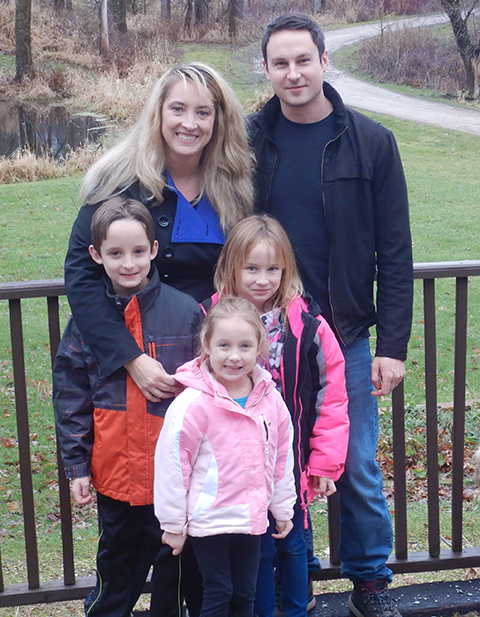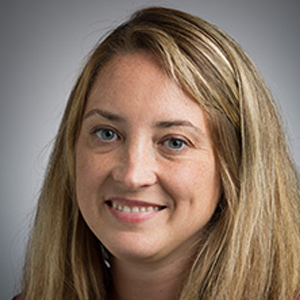Being a mother of young children while having a career in academia
I got pregnant with twins during the last part of my postdoctoral training. The pregnancy was planned, but the two-for-one special was a shock and wreaked havoc on my detailed financial and career plans.
I had planned to work right up until I gave birth and then not work for at least six months afterward. My due date was in December, and a new academic year didn’t start until August … see how perfectly we timed it? Then we would put the several-month-old baby into daycare, and I would continue in another postdoc or a tenure-track faculty position while my soon-to-be husband finished graduate school.
It all seemed great on paper, but then life gave our plans the finger. Everything I read indicated that twin pregnancies are high-risk and I’d increase my chance of a full-term pregnancy and healthy babies if I didn’t work full-time, or perhaps at all, during my third trimester. So working till I gave birth was out.

My search for an academic position that year was a disaster. I went to a two-day on-site interview at a good R1 university less than a month after having twins via C-section. During my presentation, several professors asked me basic questions about the rationale of my Ph.D. work. I drew a complete blank. I had barely slept in three weeks, and since I still hadn’t recovered from my C-section, I winced in pain every time I stood up, sat down, tried to walk fast or coughed. Because they had me scheduled 8 a.m. to 8 p.m. both days without any significant breaks, I couldn’t pump, so my breasts felt like they were going to explode and I was leaking continuously throughout my interview. I had scheduled all my on-site interviews for academic jobs for the following year within six weeks of giving birth. Needless to say, I didn’t get offered any positions.
For more than two years, I worked either not at all or part-time as an adjunct professor at colleges and universities that were either very close to my partner while he finished graduate school or very close to my parents. I was uncomfortable leaving our babies in the care of someone who wasn’t family. My reluctance to leave them for 40-plus hours a week was a personal, emotional reaction and a result of their temperament. If I was away for more than three or four hours, one or both would scream inconsolably until I returned. Many women are comfortable going back to work full-time six weeks after their children are born. I wasn’t, and I didn’t know that until after I actually had children.
When the twins were almost two, I started a full-time, tenure-track position at a predominantly undergraduate institution in the Midwest. A year later, we found out I was pregnant again, but with only one baby this time. Thus, I was pretenure with three children under the age of five.
Fast forward four years for the Hollywood ending: I was approved for tenure, I am still happily married to the same man, and all three of our children are alive and seem pretty happy and well adjusted.
Sounds pretty good, right? Well, here are the parts I didn’t mention — that I wish someone had told me and others understood — in convenient bullet-point form.
The bad and ugly …
-
The two years after having twins, even only working part-time, were the hardest of my life so far. Nothing else comes close. I suspect this is true for many women with single babies too.
-
Until the twins started kindergarten, I had zero time for social life, hobbies or personal relaxation. Every moment of every day, I was doing things I had to do for other people or for my job. That takes a toll.
-
I chose to work at a predominantly undergraduate institution partly because I believed it would give me adequate time to raise a family. I did not believe I could achieve tenure at an R1 institution unless we let someone else do the majority of raising our children. I may have been wrong, but that is what I believed.
-
Our house is rarely clean, I am not a PTA member, and I severely limit our children’s extracurricular activities because I do not have the time or energy to be their evening and weekend chauffeur.
The good-ish …
-
During the academic year, I never work more than 45 hours per week, some of this from home, and during breaks I generally work less than 25 hours per week. I take six weeks completely off, four in the summer and two at Christmas time. These might seem like lazy work hours to many, but I hope it is a beacon of hope to women who want to have children and have a career in academia.
-
To limit my work hours, I must be extremely efficient. I do no social media or water-cooler chitchat at work, I severely limit meetings, and I close my office door for a couple of hours every morning. This is my most productive time, obviously.
-
If I cannot bring my children, then I say no to (almost) all evening and weekend meetings and events. My kind and understanding colleagues accepted this choice and still approved me for tenure. Not all colleagues will be this progressive, but maybe if they understood what it is like to be a mother with young children in academia, they could be?
Were the sacrifices worth it? For me, yes. Our children have secure attachments to my husband and me that hopefully will serve them well in their futures. I have a career I enjoy: I get to teach great students and do research that I love. I don’t do as much research as I’d like, and I will likely never be a leader in my field, but this is an acceptable balance for me.
A lot of female students ask me, “Can I have a family and have a career in academia in science? Can I realistically raise kids while being a professor?” Here’s what I want to tell them:
“Yes, you can, but it will be difficult when your children are young. You must decide how much time you want to spend with your family and come to terms with the reality of your biological clock and the reality of what it will take to achieve tenure. Something will have to give, because there are only so many hours in a day. You can’t be the very best in your job and the very best mother: You will have to choose what to let go of.”
For those of you who are like the young women who wander into my office to ask me such questions, I will end with more bullet points (I love the efficiency of bullet points). Here are some ways to make it easier, though still not easy, to have an academic career while raising young children:
-
Find the right partner — someone who fully supports your career and is willing to be a true and equal partner when it comes to raising little ones and keeping a household. Sheryl Sandberg is correct on this, and I am extremely lucky in this respect.
-
Try to live close to some extended family. I have been able to attend conferences once or twice a year only because my mom is just a five-hour drive away. Our geographical location was not an accident; I wish we lived even closer.
-
Accept that your house will not be clean for a few years, and that is OK. Better yet, hire a housekeeper (if you can afford it).
-
Decide how many hours a week you will dedicate to your job and enforce it. An academic career will take as much time as you give it; it’s as easy to work 60 hours a week at a small college as it is at a big university. Say no to everything that puts you over your time allotment. Accept the consequences of your decision without guilt or shame.
-
Learn to say no in a diplomatic way, and do so as often as possible. This is perhaps the most important skill to master if you want a meaningful life outside of work.
-
Check and respond to email only once a day. Limit meetings as much as possible. Accept that you may have no social life or free time until your youngest starts school.
-
Learn to love coffee.
In less than a year, our youngest will start kindergarten and our twins will enter third grade. This, combined with the relaxation I’ve begun to feel since being approved for tenure, leads me to believe that my future life will not need to be quite as streamlined as the past seven years. Who knows, maybe I’ll be able to focus on doing more research and publish twice a year instead of once every couple of years. Or maybe I’ll just have time to go out occasionally for drinks with friends. One can dream.
Enjoy reading ASBMB Today?
Become a member to receive the print edition four times a year and the digital edition monthly.
Learn moreFeatured jobs
from the ASBMB career center
Get the latest from ASBMB Today
Enter your email address, and we’ll send you a weekly email with recent articles, interviews and more.
Latest in Careers
Careers highlights or most popular articles

Close out ASBMB 2026 with a bang
The closing reception of the 2026 ASBMB Annual Meeting will be held at the Torpedo Factory Art Center in Alexandra, Virginia.

Redefining lipid biology from droplets to ferroptosis
James Olzmann will receive the ASBMB Avanti Award in Lipids at the ASBMB Annual Meeting, March 7–10, just outside of Washington, D.C.

Creating change in biochemistry education
Pamela Mertz will receive the ASBMB William C. Rose Award for Exemplary Contributions to Education at the ASBMB Annual Meeting, March 7-10 in Washington, D.C.

Trainee mentorship as immortality
Suzanne Barbour will receive the ASBMB Sustained Leadership Award at the ASBMB Annual Meeting, March 7-10 in Washington, D.C.

Upcoming opportunities
Join us Feb. 5! The monthly ASBMB Transcription Webinars aim to facilitate knowledge exchange and collaboration among researchers in the fields of transcription, chromatin and epigenetics.

Life in four dimensions: When biology outpaces the brain
Nobel laureate Eric Betzig will discuss his research on information transfer in biology from proteins to organisms at the 2026 ASBMB Annual Meeting.

